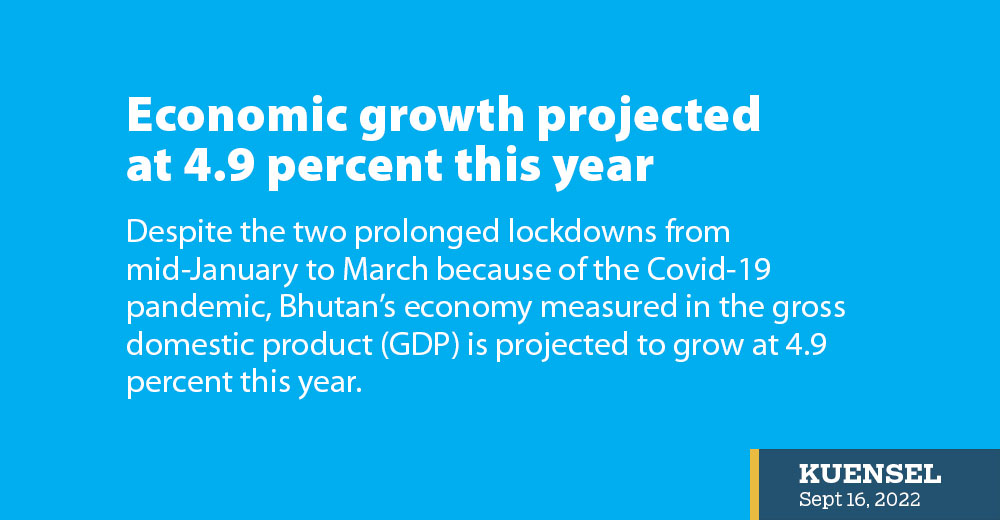Thukten Zangpo
Despite the two prolonged lockdowns from mid-January to March because of the Covid-19 pandemic, Bhutan’s economy measured in the gross domestic product (GDP) is projected to grow at 4.9 percent this year.
This is according to the finance ministry’s fourth quarter macro-economic situation report released recently.
The economy is expected to grow with the country achieving mass vaccination backed by robust policy measures and gradual opening up of tourism by September this year, the ministry stated, adding that there is no emergence of new variants or mobility restrictions while government spending continues to boost aggregate demand and investments.
In 2021, the Bhutanese economy grew at 4.1 percent, an increase of 14.1 percentage points compared to a decline of -10.1 percent in 2020. The economy was supported by the government’s expansionary fiscal policy, monetary support and progressive relaxation of containment measures.
The agriculture sector is expected to slightly grow at 2.18 percent from 2.05 percent last year after a growth of 4.6 percent in 2020 because of reduced production in the livestock and forestry sector.
The industry sectors namely mining, quarrying, and construction would see a growth of 4.37 percent from 1.96 percent last year.
However, the service sector would dip to 5.42 percent from 6.3 percent this year. Despite the tourism industry being at a standstill, the revival in retail trade and other domestic businesses, steered the growth of the service sector, contributing around 44 percent to the GDP in 2021.
GDP represents the flow of goods and services because of the economic activities that take place in the economy. It is the sum of the values of all goods and services produced within the economic boundary of the country, which is available for final uses such as consumption, investment, and exports.
An expansion of GDP results in the creation of jobs, and an increase in people’s income levels and consumption capacity. It also means higher profits for companies, including the government and corporations.
However, the finance ministry stated that because of the heightened global and regional uncertainties coupled with emerging issues within the domestic economy, down risk to growth is anticipated.
“The consequences of rising geopolitical conflict and increasing food and energy prices will adversely impact the economy posing risks to growth prospects,” it added.
The higher cost-push inflation will weigh on the economic sectors including households, businesses, and the government. It will also increase the higher import prices of energy and food which will result in an increase in the prices of domestic production. “The surge in prices combined with low growth and high unemployment may lead to stagflation crippling the economy,” the report stated.
The prices of goods measured in the consumer price index reported at 5.9 percent in fiscal year 2021-22 is expected to grow at 7 percent in fiscal year 2022-23 and 6.7 percent in fiscal year 2023-24.
With the stronger growth in imports than exports, Bhutan will face risks of widening current account deficit which will put pressure on already declining reserves in the economy.
The ministry projects that the current account balance will deteriorate to negative 28 percent of GDP equivalent to Nu 54 billion (B) in fiscal year 2021-22 from 12.1 percent (21.8B) in fiscal year 2020-21.
“The net financial inflows which are used to finance the current account deficits over the period have been decreasing due to lower inflow of official grants, thereby impacting the gross international reserves,” the ministry stated.
However, the total imports this year from January to June increased by 52 percent compared to the same period last year while exports increased by 24.3 percent only.
The ministry stated that if a similar trade pattern continues in the coming months, the total imports is projected at Nu 111.3 billion (B) and export at Nu 60.4B. This will further widen the trade deficit.
According to the Royal Monetary Authority’s monthly statistical bulletin, Bhutan’s gross international reserve depleted to USD 839.6 million (M) in June this year from USD 1,274.6 in July last year.
“As prospects of tourism sector remain unpredictable due to global economic uncertainties, prolong the impact of Covid-19 pandemic, particularly rising inflationary pressure, depreciation of exchange rate in emerging economies, and with the expected rise in imports, the external reserve position for fiscal year 2022-23 is estimated to remain around USD 845.2M,” the ministry stated.
While in the medium term, the ministry stated that the recovery in services and hydropower is expected to drive growth, with electricity generation capacity expected to double provided the commissioning of various hydro projects on time.


